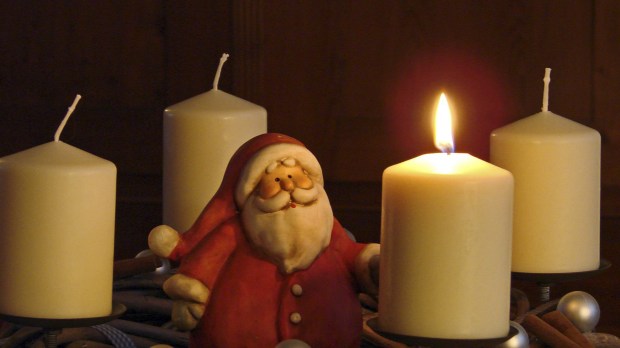The Season of Advent has arrived and no one is surprised—but perhaps we should be. And perhaps the surprise of Advent is not a pleasant surprise. But Advent is (or at least ought to be) a pointer to the most unlikely and bewildering surprise the human race has ever known. The Season of Advent is a pointer to the Season of Christmas, the celebration of the Incarnation of Our Lord, when the Christ of God Who is the only-begotten Son of God became the Son of Mary, as human as us in every way but sin.
What could be more surprising, more unlikely, than the perfect and all-holy God taking upon Himself the limits of human nature and the cost of human sin? But God did, in the person of Jesus of Nazareth. Surely a surprise! But is it a pleasant surprise? Don’t rush to answer that just yet. Hear me out.
When my mother was in high school, one of her favorite movies was, “The Man Who Came to Dinner.” It features a sharp-tongued theater critic who visits an “ordinary” family in Ohio. As he’s about to leave the house, he falls and breaks his leg. He’s carried back inside, where he stays for six months to recuperate, and then dominates the house and its occupants. The plot puts to the most severe test advice columnist Ann Landers’ observation that, “House guests are like fish—after three days they begin to smell.”
My point is this: The Son of God became man, not as a mere guest, however welcome or unwelcome, but as a permanent resident in human life. But even that statement puts the matter too gently. When God becomes man, He comes to stay, and He comes as Lord. At the Incarnation, Jesus, Son of God and Son of Mary, became and remains forever the decisive fact, measure and goal of the human condition. From the first moment of the Incarnation, all human actions and words must be referred back to Jesus Christ as the meaning of human life. From that moment on, anything that claims to be human is not fully human unless it is seen in the light of who Jesus is, what He said and did, and what He promised.
In other words, the potentially unpleasant surprise that Advent may be pointing to is that we humans, whether individually or collectively, do not have the final say about what it means to be human, or how to live human life poorly or well. As a result of the Incarnation, human wisdom can only be authentically human wisdom if it harmonizes with the work and purposes of Jesus Christ for humanity in this life and the next. What we mark at Christmas is that Christ has come to us, not as a mere guest or resident but as Savior and as Sovereign. Advent reminds us that we must prepare ourselves to receive that amazing and demanding gift.
Now, depending upon how much we love our sin, that fact can be a most unpleasant surprise, and thoroughly inconvenient as well. Jesus came to lift us out of our self-made darkness. He came to purify us of our wickedness, and He came to prepare us for eternal life in union with the infinite love of God. That means no evil, no selfishness and no hatred allowed.
If you and I are ready, right this moment, to renounce decisively our claims to our disordered attachments and desires, if we are ready right now to throw down our idols, then, sure, let’s all pole-vault right over Advent and celebrate Christmas. Let’s all celebrate the Incarnation, the unexpected gift from the God-Man Who came to us and has refused to leave.
If you’re like me, however, and find yourself dithering between accommodating sin and longing for righteousness, then Advent is a time of great mercy. Advent is a perennial gift meant to wake us up to the most inconvenient truth of all—namely, that only the pure can see God and live. The Son of God became man for all of us and for each of us. He united Himself to human nature so that we might be united eternally to divine nature. That perfection of human life requires that we accept God’s grace and His means of purification. The inconvenient truth pointed to by Advent is that we are made for an eternal glory that we are free to accept or reject. And in the end, God will ratify whichever choice we make.
Let’s spend this Advent, then, as people with a journey and a decision to make. We are pilgrims, passing through this finite life towards eternal life. This Advent, let’s put aside whatever will take us off course or slow us down. Each of us has a unique list of junk and illusions we must get rid of—our sins, lies and idols—if we are find the grace of Christmas that Advent points to. Before Christmas, tell yourself, God and one other person, that this Advent you will take up an act of charity, that you will name and renounce one sinful habit, and that you will go to Confession. If you do that, then odds are that the Christmas joy that Advent points will take root in your heart.
When I write next, I will speak of the Immaculate Conception. Until then, let’s keep each other in prayer.
Father Robert McTeigue, SJ,is a member of the Maryland Province of the Society of Jesus. A professor of philosophy and theology, he has long experience in spiritual direction, retreat ministry and religious formation. He teaches philosophy at Ave Maria University in Ave Maria, FL, and is known for his classes in both rhetoric and medical ethics.

